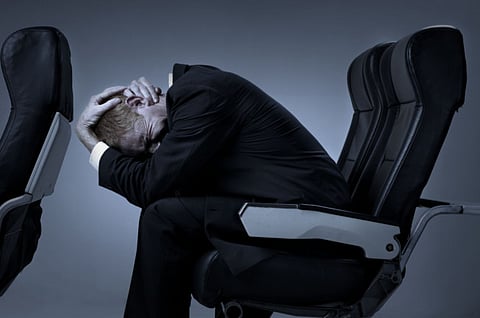Fear of flying haunts many UAE residents
One out of four people in the country dreads boarding a flight. Luckily there are some courses to combat the phobia

ABU DHABI Statistics say you are far safer in the skies than on the roads. Motorcycling is 3,000 times deadlier than air travel and travelling in a car is 100 times more dangerous than flying, but those with aviophobia - an extreme fear of flying - avoid it like the plague.
According to a British Airways survey, one in four people in the UAE has a fear of flying.
An extreme case is that of British boy Joe Thompson, 12, who was stranded in Abu Dhabi for nearly two years because of his fear of flying.
After he refused to board a plane on four occasions, his parents had to eventually seek the help of a hypnotherapist who accompanied him during the flight back home in 2013.
But you don’t have to necessarily take that route as there are several self-help books and courses (see right) available in the UAE to conquer your fear.
As a rash of air accidents makes headlines, XPRESS spoke to residents who are fighting their own battles with the phobia of flying.
Abu Dhabi resident Nahla Nabil who has 12 years of experience in aviation says the very thought of flying makes her stomach churn.
Recalling how the fear developed in her, the New Zealander said it all started in 2004 when she had to endure a turbulent flight to Thailand. “The plane suddenly dropped midair and I remember screaming my heart out. Ever since, I have hated flying,” she said.
“My family and friends are bemused because I am an aviation professional who can strip a model plane to pieces and reassemble it. But I still had to take a flight familiarisation course to allay my fears,” said the mother of two.
Russian Tanya Biryukova, who is a higher education professional from Abu Dhabi, is another victim of aviophobia. Her fear dates back to her childhood in a small Russian town close to a military airport.
“I grew up seeing air crashes and hearing horrific stories of deaths of pilots who lived in our neighbourhood. So I could never associate flying with a pleasant feeling,” Biryukova, 46, said. Her fears got worse as she grew. “I became so insecure about flying that I would take 48 hours to recuperate from the traumas of air travel. I tried everything from medicines to hypnotherapy. Nothing worked,” she said.
Finally, help came in the form of a book – Alen Carr’s Easy Ways to Enjoy Flying. “The book helped me to put myself in a ‘safe zone’ where I learned to reason with my fears,” said Biryukova.
Dubai resident Salim Ahmed, 38, said he overcame his phobia after signing up for a Fear of Flying session at Dubai Mall’s iPilot Flight Stimulator.
“It set me back by around Dh900 but it helped me immensely. Now I have a greater understanding of how a plane works and the safety measures it has.”
Renowned US-based master clinician Martin N. Seif reckons there is a huge component of anticipatory anxiety, or the fear experienced in anticipation of taking a flight. Any successful treatment will help fearful fliers manage anticipatory anxiety as well as during a flight.
“Education helps calm anxiety, too: how a plane flies, facts about turbulence, and the meaning of the various sounds and bumps during a normal flight,” he says.
Learn to fight fear of flying
British Airways offers a ground course in Dubai to help you conquer your fear of flying. The one-day course covers all the technical aspects of flying as well as the psychology and physiology of fear.
Price: Dh1,499
www.flyingwithconfidence.com
iPilot Flight Simulator offers a 60-minute Fear of Flying Session at Dubai Mall and Mirdif City Centre. The sessions help you understand how an airplane is controlled including the safety measures. A qualified pilot will explain the noises that a plane makes and explain what happens in emergencies.
Price: Dh899
You may have a fear of flying if:
You don’t like being in enclosed or crowded spaces.
You have a fear of heights.
You have a fear of being over water.
Flying, or even the thought of flying, makes you tense, or leads to headaches, nausea, fatigue, or other physical discomfort.
You are very concerned about the risks of death or injury from aircraft accidents or from hijackings or other deliberate attacks on an aircraft.
You experience sudden or prolonged panic attacks when you fly or when you are about to get on an airplane.
You arrange your life to limit the amount of flying that you do, or you avoid flying altogether.
You become easily angered by others when you fly.
The sounds and activities associated with a normal flight bother you.
You are concerned about turbulence and other weather conditions.
(courtesy Airsafe.com)
YOUSPEAK: Do you suffer from aviophobia? How do you deal with it?



